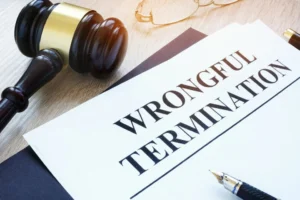
Losing a job is difficult under any circumstances, but when you feel like the termination was unfair—or worse, illegal—it can be especially painful. While Maryland is an at-will employment state, meaning employers can generally fire employees at any time, there are important legal exceptions. Certain types of firings are considered wrongful termination, and they may give you grounds to take legal action.
If you’re unsure whether your firing crossed the line, here are five common signs you may have been wrongfully terminated in Maryland.
1. You Were Fired After Reporting Discrimination or Harassment
One of the clearest signs of wrongful termination is retaliation. If you reported discrimination or harassment—whether related to race, gender, religion, disability, age, or another protected category—and were fired shortly afterward, that’s a red flag.
Under both federal and Maryland law, it is illegal for employers to retaliate against employees for:
- Reporting unlawful workplace behavior
- Filing a complaint with HR or a government agency
- Participating in a workplace investigation
- Opposing discriminatory practices
Even if the underlying claim of discrimination or harassment turns out to be unproven, your termination may still be illegal if it was motivated by retaliation. Timing is often key. If your firing happened shortly after you spoke up, it may not be a coincidence.
2. You Were Treated Differently Than Other Employees
Were you singled out for discipline, demotion, or termination, while other employees in similar roles were not? Unequal treatment could be a sign of discrimination or retaliation—especially if the reason for your firing seems inconsistent with how others were treated.
Examples include:
- Being fired for a minor mistake while others made similar errors without consequence
- Being disciplined more harshly than coworkers for the same behavior
- Being let go after returning from maternity leave, medical leave, or requesting accommodations
Disparate treatment based on protected characteristics (such as race, sex, age, or disability) may qualify as wrongful termination under Maryland and federal employment laws.
3. You Were Fired After Reporting Illegal Activity (Whistleblowing)
If you were terminated after reporting illegal activity by your employer—such as wage theft, safety violations, fraud, or environmental violations—you may be protected under whistleblower laws.
In Maryland, several laws protect whistleblowers, including:
- The Maryland Whistleblower Protection Act (for public employees)
- The Maryland False Claims Act
- Federal statutes like the Occupational Safety and Health Act (OSHA) and Sarbanes-Oxley
Employers are not allowed to fire employees in retaliation for reporting illegal conduct, either internally or to a government agency. If your firing followed a report or complaint about illegal or unethical practices, you may have a valid wrongful termination claim.
4. You Had a Contract That Was Violated
Not all employment in Maryland is strictly at-will. If you had an employment contract—whether written, verbal, or implied—it may limit the employer’s ability to terminate you without cause.
Signs of a contractual relationship include:
- A written agreement stating specific terms for termination (e.g., only for cause or with notice)
- An offer letter or employee handbook outlining job security terms
- Employer policies that promise progressive discipline before termination
If you were terminated in violation of these terms, it could constitute a breach of contract and support a wrongful termination claim. Even if you didn’t have a formal contract, implied agreements or promises made by the employer may be enforceable under certain circumstances.
5. The Stated Reason Doesn’t Add Up
Sometimes, the official reason given for your termination simply doesn’t make sense—and that can be a clue. If you suspect the explanation was just a cover for a discriminatory or retaliatory motive, trust your instincts and look for inconsistencies.
Common red flags include:
- Sudden poor performance reviews after years of positive feedback
- Termination right after requesting leave, accommodations, or filing a complaint
- No clear explanation or documentation of why you were fired
- Changing stories from your employer about the reason for your termination
Courts often look at these inconsistencies when evaluating wrongful termination claims. If the employer’s justification appears false or inconsistent, it may support your case.
What to Do If You Suspect Wrongful Termination
If any of these signs apply to your situation, you don’t have to face it alone. Here are steps you can take:
- Document everything – Save emails, performance reviews, witness statements, and a timeline of events.
- File a complaint – Depending on the situation, you may need to file with the EEOC, Maryland Commission on Civil Rights, or a relevant agency.
- Consult an employment attorney – An experienced lawyer can help assess your case and guide you through the legal process.
Final Thoughts
Wrongful termination is more common than many employees realize, but proving it requires understanding the law and knowing what to look for. If you were fired and one or more of the signs above applies to your situation, you may have legal grounds to take action.
Employment laws exist to protect workers from being fired for the wrong reasons. Don’t ignore your rights—if something doesn’t feel right about the way you were let go, consider speaking with a Maryland employment lawyer to explore your options. We recommend wrongful termination lawyers maryland.






